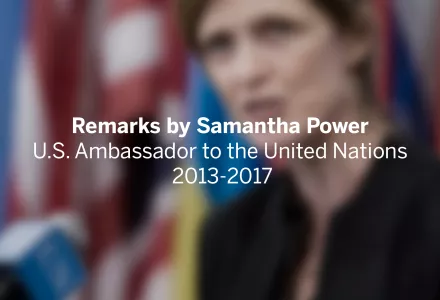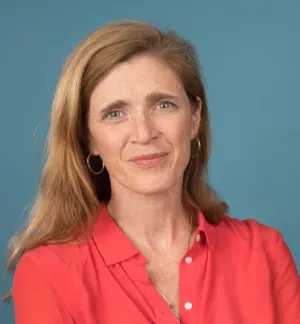
Thank you. Mr. Secretary General, Madam Vice President, Ambassador Gasana, Ambassador Antonio, Mr. Kalima, Mr. Nasser, guests and friends. Thank you for inviting me to share in this commemoration. I am most honored by the invitation to join you, and humbled to attempt to offer remarks on a stage and in a room filled with those who have suffered so much.
On behalf of President Obama and the United States, I join with the citizens of Rwanda and people everywhere in expressing our enduring grief and sadness at the momentous crime that transpired two decades ago this month. Our sorrow is magnified by the knowledge that the Rwandan genocide was neither inevitable, nor unforeseeable, nor unstoppable. Because hate was not resisted quickly and forcefully enough, more than 800,000 men, women and children were killed.
Every day perpetrators, murderers, were deciding how far they would go. And we failed to affect their calculus.
No words can change that reality; no physician can heal it; no tears can wash it away. For those who lost loved ones, the pain will never go away. The screams of twenty years ago had their echo in the wails of grief heard at the commemorations in Amahoro Stadium in Kigali this past week. Wails and screams of agony that punctured the formality of the occasion with a human reminder of the searing grief that none of us here would be able to bear and that none of us privileged to be present in Kigali last week will ever forget.
With this knowledge always within us, let us vow nevertheless to move ahead with the unfinished tasks of recovery, reconciliation, and accountability in Rwanda, and to apply lessons that will enable us to look back in twenty years with pride, rather than sadness, at what we have accomplished. We have made progress, but sometimes our regret over what we let happen over those 100 days causes us to mourn -- with sincerity -- without sufficiently strengthening the international system we need to truly assure ourselves that our preparation and practice today is up to the challenges we face.
Sometimes we are still slow to recognize that the atrocities we are seeking to prevent, even if not on a scale of the Rwandan genocide, are upon us. Before Rwanda, the international community committed never again to allow genocide, because we had been so moved by the lessons of the Holocaust. Yet two days after the killing in Rwanda had begun, the United States State Department held a press conference to highlight the importance of the film Schindler’s List. U.S. officials talked with great earnestness about one key lesson of the Holocaust. They said, “even in midst of genocide, one individual can make a difference.”
Nobody in the U.S. government, or in the press, or – to my knowledge – in the public, the American public made the connection between the singular genocide we were learning from – the Holocaust – and the new epic genocide that was then underway.
Let this be a warning to us. We cannot make that mistake today. And here I quote Ambassador Gasana, “let this day – our day – be not only an act of remembrance but a remembrance to act.” There’s been some progress. Rwanda taught us that genocide could happen in our age. We are informed today by the recognition that it is the duty of every country both to protect its own people from mass atrocities and to assist in safeguarding others, and by the recognition that, as President Obama has said “we need to be doing everything we can to prevent and respond to these kinds of atrocities -- because national sovereignty is never a license to slaughter your people.”
In trying to prevent and respond we benefit from instruments that didn’t exist two decades ago, like the UN’s Special Advisers on the Prevention of Genocide and the Responsibility to Protect, the work of robust Commissions of Inquiry mandated by the Human Rights Council, and improvements in the training and deployment of peacekeeping forces, including the addition of well-trained and fiercely determined Rwandan blue helmets who have vowed to prevent atrocities and bring “never again” to life in our time.
Let us combine our strengths to sharpen every aspect of our response to humanitarian catastrophe – from prevention and early warning, to the training and timely deployment of peacekeepers, to smart sanctions and prosecutions for war crimes. We must pledge our best efforts to confront, address, and defeat everywhere the practices that may give rise to genocide and mass atrocities – including discrimination, dehumanization, demagoguery, and the suppression of civil and political rights.
In closing, I would like to speak to the Rwandans here tonight. We who are symbols of the international community today have only words of regret and awkward apology to offer you. But I want to close by conveying three deep truths. First, please know how seriously we take your pain and your loss. Not just the pain of 1994, the pain of an unimaginable slaughter; but the pain and loss you live with every day – every minute of every day; the pain of the void.
Second, you Rwandans, you’ve changed the world. Your history of devastation has become our history of collective failure. We have scrambled to try to do better. We know what is possible because you will never – and you should never – let us forget. We are far from perfect; we don’t have to tell you. But you have made us improve. You have helped us improve.
Third and finally, you started your new country in 1994 with nothing. But not just with nothing, with streets and fields and rivers and homes filled with the fallen bodies of your brothers and sisters, your sons and daughters; with a crime docket of 800,000 murders. You decided -- those of you who remained – to build a new Rwanda. You have made unbelievable strides. And you have a long journey yet ahead.
We were not there for you 20 years ago. But we promise we are here to help you build that bright future that you so deserve.
Thank you.
###
Power, Samantha. “Remarks by Ambassador Samantha Power at the United Nations Commemoration of the 20th Anniversary of the Rwanda Genocide.” April 16, 2014


